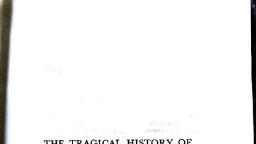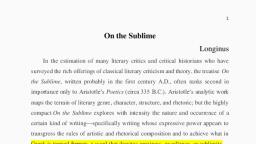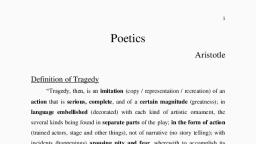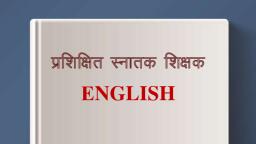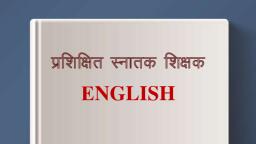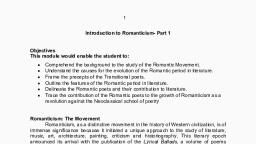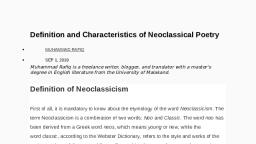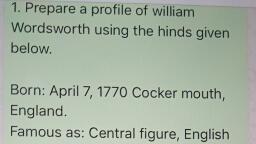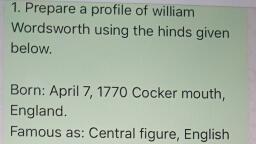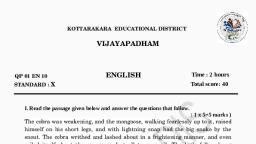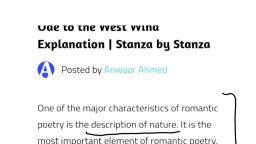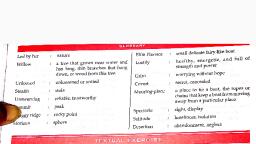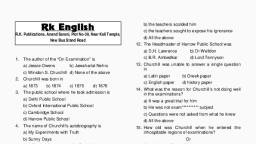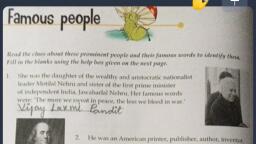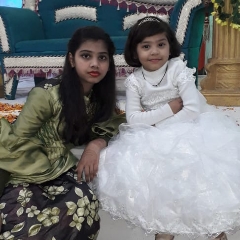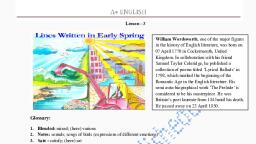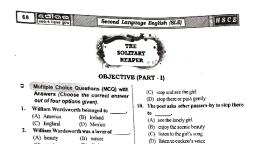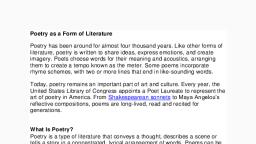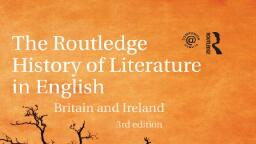Page 1 :
1, , Preface to the Lyrical Ballads, William Wordsworth, William Wordsworth was a world-acclaimed English poet who was born, on the 7 April 1770 in Cockermouth, Cumberland, in North-west England., Second of the five children to John Wordsworth and Ann Cookson, poetry was, infused in him right from the beginning by his father. His mother taught him to, read while he attended various local schools. He was also introduced to Milton,, Shakespeare and Spencer through his father’s library quite early in his life. Noted, poet and diarist, Dorothy Wordsworth was his sister, younger to him by only a, year. In 1778, after the death of his mother, his father sent him to Hawkshead, Grammar School in Lancashire. In 1787, he began attending the St. John’s, College in Cambridge from where he received his B.A. degree in 1791. By then,, he had already started writing. His first publication was a sonnet in The European, Magazine back in 1787., Wordsworth was Britain’s Poet Laureate from 1843 until his death in, 1850. Wordsworth (1770 –1850) brought a completely new approach to the, writing of English poetry. The well-known characteristics of his revolutionary, artistic achievements are his objections to an over-stylized poetic diction, his, attitude to Nature, his choice of simple incidents and humble people as, subjects for his poetry. Poetry for him was primarily the record of a certain kind, of state of mind, and the value of poetry for him lay in the value of the state of, mind which the poem recorded., THE PREFACE TO LYRICAL BALLADS, Lyrical Ballads was not Wordsworth’s first publication; he has started, publishing poetry from 1793 onwards. In the year 1793, Wordsworth’s first, published poetry with the collections An Evening Walk and Descriptive, Sketches. Wordsworth’s The Prelude is usually thought to be his magnum opus
Page 2 :
2, , / masterpiece which is a semi-autobiographical poem of his early years. He revised, and expanded The Prelude a number of times., Lyrical Ballads was planned with Coleridge in 1797, when Wordsworth, was living at Racedown with his sister. The volume appeared the following year,, with 04 poems by Samuel Taylor Coleridge (including The Ancient Mariner) and, 19 poems by William Wordsworth. The materials of poetry can be found ‘in, every subject which can interest the human mind’ and explained that these poems, were experiments written chiefly ‘to ascertain how far the language of, conversation in the middle and lower classes of society is adapted to the, purposes of poetic pleasure.’, Preface to Lyrical Ballads published in 1798, heralded a new era in the, history of English literature and with the publication of this volume of poems by, William Wordsworth and Samuel Taylor Coleridge, the Romantic Era begins., These two poets met in 1795 and immediately recognized each other’s calibre, and joined hands to create something new in the field of literature. Their wishes, came true with the publication of this volume of poetry Lyrical Ballads, which, also had a short Foreword by William Wordsworth., The Second edition of the volume came out in 1800 with a Preface by, Wordsworth. In 1802, another revised edition was published which had more, significant additions. Wordsworth in the very beginning of the Preface to the, Lyrical Ballads points out four essential principles of poetry that are included, in Lyrical Ballads and also propagates the reason for such poems –, • Themes from ordinary life;, • Expressed in the day-to-day language of ordinary men;, • Coloured by Imagination;, • Through and in them the universal and primary laws of human, nature be brought out.
Page 3 :
3, , In Wordsworth’s language, the principal object of the poems in the Lyrical, Ballads is: to choose incidents and situations from common life, and to relate, or describe them, throughout, as far as was possible in a selection of language, really used by men, and, at the same time, to throw over them a certain, colouring of imagination, whereby ordinary things should be presented to, the mind in an unusual aspect; and, further, and above all, to make these, incidents and situations interesting by tracing in them, truly though not, pretentiously, the primary laws of our Nature …, In the Preface, the poet-critic Wordsworth discusses several issues, related, to poetry, which can be categorized under the following heads –, • Definition of Poetry, • Defining Poet, • Value of Poetry, • The nature of Poetic Diction, 1. Wordsworth’s Definition of Poetry, One of the key issues William Wordsworth deals with in the Preface to the, Lyrical Ballads is the concept of poetry. For Wordsworth: … all good poetry is, the spontaneous overflow of powerful feelings…. The Preface suggests that, emphasis of Wordsworth in composing good poetry is ‘spontaneous overflow of, powerful feelings’; but at the same time the expression of the feelings is not as, spontaneous as Wordsworth suggests that the poet had to think ‘long and deeply’, before he gives expression to his feelings. Later in the Preface Wordsworth adds, – I have said that poetry is the spontaneous overflow of powerful, feelings: it takes its origin from emotion recollected in tranquillity: the, emotion is contemplated till, by a species of reaction, the tranquillity, (composure / calmness) gradually disappears, and an emotion, kindred to, that which was before the subject of contemplation, is gradually produced,, and does itself actually exist in the mind. In this mood, successful
Page 4 :
4, , composition generally begins, and in a mood similar to this it is carried, on…, Thus, for Wordsworth, unlike the eighteenth-century poets whose, emphasis is on the imitative rationalist aesthetic, poetry finds its origin from, the emotions of the poet though it should have universal appeal, as that is the, only way the poet can ensure that his creation is understood by his readers., Therefore, Wordsworth refers to Aristotle and says that: Aristotle, I have, been told, has said, that Poetry is the most philosophic of all writing: it is so: its, object is truth, not individual and local, but general…. Thus, going along with the, beliefs of the romantics, Wordsworth emphasized that the tendency of art or, aesthetic object should be from the individual to the universal. ‘Poetry being the, image of man and nature’ makes Wordsworth transcend (exceed/surpass) the, personal feelings in the process of creative expression to make it have a universal, appeal., Wordsworth has given a number of memorable definitions of poetry such, as “a spontaneous overflow of powerful feelings which takes its origin from, emotions recollected from tranquillity” He says “Poetry is the breath and finer, sprit of all knowledge.” This definition of poetry gives us an idea of, Wordsworth’s poetics. This definition highlights the spontaneity and, emotionalism of poetry. He says: “Poetry is the breath and finer spirit of all, knowledge; it is the impassioned expression which is in the countenance of all, sciences. This definition explains how poetry blends passions and knowledge., According to Wordsworth, poetic truth is superior to scientific truth, for it is based, on universal facts of life and hence can be appreciated by all. While the scientist, makes only a surface study, the poet probes into the inner reality and arrives at, the soul of things. As he is a man of fine sensibility, the truth which he discovers, is surcharged with his personal emotions. These emotions are recollected in
Page 5 :
5, , tranquillity and in a rare mood gush /flood out as a spontaneous poetic, outpouring., Defining Poet, Identifying the key issues of good poetry, Wordsworth shifts to what the, poet should be and here he identifies three key features of a poet: 1. The poet should be exceptionally sensitive ‘endued with more than, lively sensibility, more enthusiasm and tenderness … a more comprehensive soul, than are supposed to be common among mankind.’ This exceptional sensitivity, of the poet makes him a perceiver who not only does feel his emotions strongly, but feels for everything around him – man and Nature. Thus, for Wordsworth, the, poet is an extraordinary creature having the power of feeling more, comprehensively than any other common human being., 2. The poet is ‘a man speaking to men.’ The poet’s role does not stop at, the power to feel enthusiastically and sensitively, but the other greater role is to, express those strongly felt emotions to his readers. In other words, the poet is not, merely a self-indulgent creature seeking pleasure in deep feelings but has a social, responsibility. A great poet is a man of integrity who gives his readers the chance, to rectify their feelings by his poetry. Therefore, Wordsworth adds, ‘every great, poet is a teacher. I wish either to be considered a teacher or as nothing.’, 3. Wordsworth also endows the poet with a strong imaginative power –, that is he has the power to perceive ‘absent things as if they are present.’, Romantics believe that it is through imagination that they can transcend the pains, of this world and aspire for the ideal. Wordsworth, thinking along the similar line,, asks the poets to be imaginative as it is this quality that distinguishes them from, the commoners and makes them a poet. Percy B. Shelley significantly said ‘the, Poets are the unacknowledged legislators of the world.’ They are legislators as, they provide the world with better or the idealistic version through their, imagination; even though they live in the same world of flux, fever and fret.
Page 6 :
6, , The Value of Poetry, Wordsworth attaches much importance to the language of poetry as it is, the medium though which the poet communicates with his readers – ‘… the, medium through which, in poetry, the heart is to be affected, is language; a thing, subject to endless fluctuations and arbitrary associations. The genius of the poet, melts down to these to his purpose.’ Wordsworth thought, similar to others, that, language is the most significant aspect of poetry as ‘language and the human, mind act and react on each other.’, Comparing science with poetry, Wordsworth says – The knowledge both, of the Poet and the Man of Science is pleasure; but the Man of Science seeks truth, as a remote and unknown benefactor; he cherishes and loves it in his solitude: the, Poet, singing a song in which all human beings join with him, rejoices in the, presence of truth as our visible friend and hourly companion. Poetry is the, breath and finer spirit of all knowledge; it is the impassioned expression, which is in the countenance of all Science., Poetic Diction, Wordsworth’s theory of poetic diction, as put forward in the Preface to, Lyrical Ballads invited a lot of controversy in the Romantic Age and afterwards., Wordsworth was against his predecessors, the eighteenth-century poets for their, use of stylistic devices and figures of speech in the poetic diction. Wordsworth is, of the view that there can be no single poetic style that all the poets, in every age, can follow, as in every age, every poet’s mode of experience is peculiar to him, and that experience should find expression in the language which is best suited to, put forward that experience to the readers., The classical poets naturally wrote in a figurative language as it suited their, themes and the age in which they were writing. But the eighteenth-century poets,, according to Wordsworth, consciously imitated the classical model of writing and, consequently there is artificiality in their diction. Therefore, Wordsworth rejected
Page 7 :
7, , the stereotypical, artificial and stagnant poetic diction of his predecessors and, asserted that his poetry will be in the most natural language of men, the language, of the rustic as their language, which is similar to their way of living. It is the, language of the rustics which needs to be purified for the sake of poetic use –, Low and rustic life was generally chosen, because in that condition, the essential, passions of the heart find a better soil in which they can attain their maturity., Moreover, Wordsworth felt that the language of Poetry does not differ, much from good prose. He does not consider metre and rhyme as absolutely, essential for good poetry. He realizes that metre when superadded can give, pleasure. However, with the exception of his early poems, Wordsworth did not, adhere to his own principles. Thus, Wordsworth expresses his reservations about, the artificiality of metre and, particularly, of rhyme. In “Lyrical Ballads”, Wordsworth adopts the simple language of common men. Personifications,, figures of speech, antithesis and similar devices are rarely used. Wordsworth, maintained and practised in “Lyrical Ballads” his theory that there is hardly any, difference between the language of prose and that of poetry. According to the, poet, poetry sheds no tears such as Angels weep, but natural and human tears., That is to say, both prose and verse employ the same materials, spring from the, same source, and appeal to the same faculties., The Preface to Lyrical Ballads marked the beginning of Romantic, criticism. Romantic theory of poetry, primarily that of William Wordsworth,, attaches value to subjective experience, to personal feelings, emotions and, passions. Reacting against the artificiality of 18th century poetry, Wordsworth, promotes simplicity both in the theme and form of poetry. Wordsworth is of the, opinion that the subject of poetry should be taken from the humble and rustic life, and presented to the readers in the language of common men. Thus, the common, man of humble and rustic origin is the chief concern of Wordsworth in his poems.
Page 8 :
8, , When Wordsworth defines poetry as ‘spontaneous overflow of powerful, feelings ... recollected in tranquillity’; he is saying that poetry should not be premeditated, and in poetry, emotion should be privileged over rationality / logic., For Wordsworth, poetry is ‘the most philosophic of writing’ as in it the general, truth and essential laws of the universe and human existence finds its expression., Thus, Wordsworth did not wish to abruptly present a totally unfamiliar, kind of poetry. He found it his duty to prepare his readers for this new variety of, poems. Wordsworth expected strong opposition to his volume. Therefore, he, intended his Preface. The principal object of the Lyrical Ballads is to illustrate, how good poetry can be written on simple themes of ordinary human beings in, simple, natural language., T. S. Eliot vehemently criticizes this Wordsworthian theory of poetry, and poet in his critical essay ‘Tradition and Individual Talent.’, KEY WORDS, Romanticism: It was an artistic, literary, musical and intellectual, movement that originated in Europe toward the end of the 18th century, which, focussed on narrator’s emotion, beauty of Nature, imagination, etc., Poetic diction: It is the term used to refer to the linguistic style, the, vocabulary, and the metaphors used in the writing of poetry., Neo-classical Literature: It refers to the literature written between the, years 1660 and 1798 is often called Neoclassical literature. The literature was in, the style of the classical literature that had come before.

